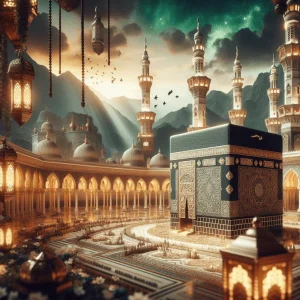Polygyny is the practice of having more than one wife, and unfortunately, it is a taboo subject for many people. Though Muslims, including those in the Middle East, are allowed to take more than one wife, this can be considered a “phenomena,” as less than 1% of marriages are polygamous. Though polygyny is rarely accepted all over the world, the ideas behind this practice make it one that binds people together instead of separating them. In fact, it preserves marriages and makes sure that divorce, affairs, and unhappiness do not occur.
First of all, it is stated in the Quran (or Koran) in Surah (chapter) al-Nisa, Verse 3: “And if you have reason to fear that you might not act equitably towards orphans, then marry from among [other] women such as are lawful to you – [even] two, or three, or four: but if you have reason to fear that you might not be able to treat them with equal fairness, then [only] one – or [from among] those whom you rightfully possess. This will make it more likely that you will not deviate from the right course.” This verse states that men can have up to four wives, or any number less than four. However, it also states that if a man can’t treat his wives with fairness, then he has to keep only one. The phrase “deviate from the right course” indicates that a man must treat all his wives with equality, in money, spending time with them, giving them what they ask, etc., and if he can’t, then to only keep one. This is fair to the wife and keeps the man from making irrational decisions in regard to marriage.
After establishing the proof that polygyny is permissible, let’s look at the wisdom behind it. Polygyny allows for more children to be born, which in turn raises the size of the ummah (community). The ummah, with a large population, will have many workers, soldiers, teachers, etc. Basically, more people equals more prosperity, the spread of Islam, and greater defense for the ummah.
Man, according to his fitrah (natural disposition), is full of desire, and sex is the only halal (lawful) outlet for these desires. Some men may have more desire than others, and so one wife may not satisfy him. If polygyny isn’t allowed, he might have an affair and end up hurting his wife and his already happy marriage. How many times has an incident like this been seen on TV, read about in the newspaper, or heard about through friends and family? If men in many countries can have as many girlfriends as they like, and have sexual relations with them, then why are people so opposed to having multiple wives? Girlfriends are not allowed in Islam, but the concept still remains – having sexual relations with more than one partner is normal, so having more than one wife is fine also.
In ratio, there are more women than men, and the Quran states that near the end of times, there will be fifty women to one man. If plural marriage isn’t allowed, look at how many wives there would be without husbands. And in times of war, it is the men who go and fight, leaving their wives behind. This lessens the number of men, and if polygyny isn’t allowed, there would be many lonely widows.
According to the fitrah of women, they have less desire than men, and so don’t need as much sex as a man does. Additionally, if a woman were to have more than one husband, she might not know who is the father of her child. And men are by nature more violent and protective when it comes to women, so many fights would occur if one woman was to have more than one husband. So it is the responsibility of the man to take care of his wives, equally, which is another part of the fitrah of human beings.
In conclusion, there are many benefits to be had from polygyny. The idea is alien to a lot of people, but if they can get past the cultural, religious, and societal barriers that prevent them from embracing polygyny, there would be far less divorces, unhappy marriages, and affairs. Given that polygyny is practiced fairly and in keeping with the Quran, marriages would be more stable, there would be happier wives and husbands, and Muslims would be taking guidance from their holy book and following the example of the Prophet Muhammad (SAWS) in keeping multiple wives.






More Stories
The Ultimate Guide to Securing Your Hajj Visa with Confidence and Ease
Unlock the Vital Importance of Mecca for Lasting Wellness and Inner Peace
The Glorious Truth: Exploring the Majestic Essence of the Kaaba Islam Definition